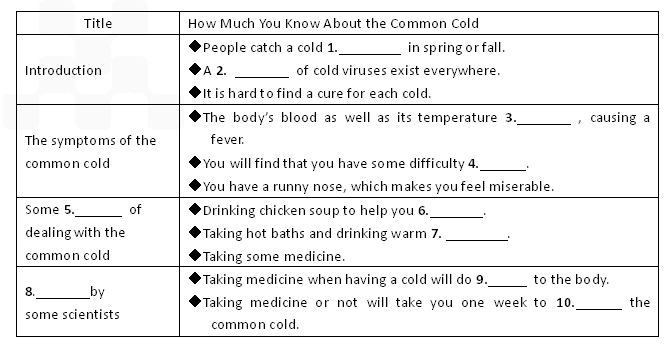
阅读理解
Baths and bathing have long been considered of medical importance to man. In Greece there are the
ruins(废墟) of a water system(系统) for baths built over 3,000 years ago. The Romans had warm public
baths. In some baths, as many 3,000 persons could bathe at the same time.
Treating disease by taking bathing has been popular for centuries. Modern medical bathing first became popular in Europe and by the late 1700's has also become popular in the United States.
For many years frequent(经常的) bathing was believed to be bad for one's health. Ordinary bathing
just to keep clean was avoided(避免), and perfume was often used to cover up body smells!
By the 1700's doctors began to say that soap and water were good for health. They believed that it
was good for people to be clean. Slowly, people began to bathe more frequently. During the Victorian
Age of the late 19th century, taking a bath on Saturday night became common.
In the United States ordinary bathing was slow to become popular. During the 18th and early 19th
centuries, many Americans were known as "The Great Unwashed!" In one American city, for example, a
person was only allowed to take a bathe every thirty days! That was a law!
Frequency of bathing today is partly a matter of habit. People know that bathing for cleanliness is
important to health. Doctors know that dirty bodies increase the chance of diseases. As a result, in the
United States, people generally bathe often. Some people bath once a day at least. They consider a daily
bath essential (=necessary) to good health.
1. A water system for baths was built by over 3,000 years ago.
A. the Romans
B. the Greeks
C. the Americans
D. the Europeans
2. The underlined word perfume probably means .
A. something smelling sweet
B. good health
C. something smelling strange
D. large wealth
3. In the 18th century doctors believed that being clean was .
A. unimportant
B. good for health
C. harmful
D. important
4. Which of the following gives the main idea of the passage?
A. Everybody in America takes a daily bath.
B. A bath a day keeps the doctor away.
C. Taking baths has become popular in the world.
D. Bathing has become easier and cheaper
5. Dirty bodies can .
A. ruin one's business
B. cause good health
C. drive customers away
D. cause disease
 备战中考寒假系列答案
备战中考寒假系列答案科目:高中英语 来源:导学大课堂必修一英语人教 人教版 题型:050
| |||||||||||||||||||||||||||||||||||||||||||||||||||||||||||||||||||||||||
查看答案和解析>>
科目:高中英语 来源:四川省月考题 题型:阅读理解

查看答案和解析>>
科目:高中英语 来源:安徽省模拟题 题型:阅读理解
| 阅读理解 | ||||||||||
|
Many people catch a cold in the springtime or fall. It makes us wonder… if scientists can send a man to | ||||||||||
| ||||||||||
查看答案和解析>>
科目:高中英语 来源: 题型:阅读理解
第二部分:阅读理解(阅读下列短文,从每题所给的A、B、C、D四个选项中,选出最佳选项。)
A
Thousands of people in the world are a hundred years old — or more and certain parts of the world are famous for the long lives of their inhabitants: the Vilacamba Valley in Ecuador, and the home of the Hunzas in the Himalayas.
Why do so many people live to a healthy old age in certain parts of the world? What is the secret of their long lives? Three things seem to be very important: fresh air, fresh food and a simple way of life. People work near their homes in the clean, mountain air instead of traveling long distances to work by bus, car or train. They do not sit all day in busy offices or factories, but work hard outdoors in the fields. They take more exercise and eat less food than people in the cities of the West. For years the Hunzas of the Himalayas did not need policemen, lawyers or doctors. There was no crime, no divorce and not much illness in their society. They were a happy, peaceful people, famous all over India for their long, healthy lives.
Do you want to live to a hundred years old? Here are some rules for success. First, choose your parents and grandparents carefully. If they lived or live to a good old age, so will you. Secondly, live in the right place. Thirdly, choose the right kind of job. Doctors, dentists and bus-drivers die young. Farmers, priests and orchestral conductors live much longer. If you are in the wrong kind of job, you can still improve your way of life.
An old man in the Caucasus was talking about his past life. “I was young then,” he said, as he described his 87th year. His secret was: “Think young and stay young.” An old woman from Missouri, USA, gave this advice, “Drink a little whisky and some warm beer every day.” An English lady just said, “Take a cold bath every morning.” The shortest, simplest piece of advice came from Mr. Jim Chapman, aged 103. “Just keep breathing,” he told reporters.
56. Who is most likely to live a long life?
A. A doctor. B. A bus-driver.
C. A dentist. D. An orchestral conductor.
57. We can see from the passage that long-lived people avoid _________.
A. working hard B. drinking
C. eating too much D. taking cold baths
58. The passage indicates that we can change our ______ to live a long life.
A. jobs B. places of living C. ways of living D. ways of thinking
59. What is mainly talked about in the last paragraph?
A. Whose advice is the best.
B. Who is the most long-lived person in the world.
C. Lifestyles of long-lived people.
D. How long-lived people think of their life.
查看答案和解析>>
湖北省互联网违法和不良信息举报平台 | 网上有害信息举报专区 | 电信诈骗举报专区 | 涉历史虚无主义有害信息举报专区 | 涉企侵权举报专区
违法和不良信息举报电话:027-86699610 举报邮箱:58377363@163.com